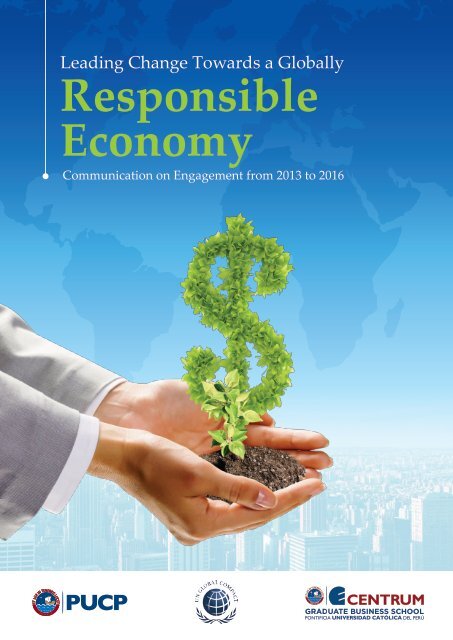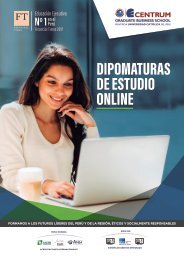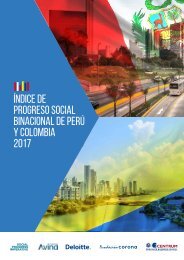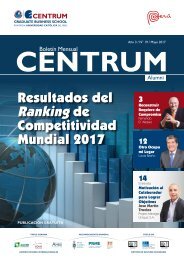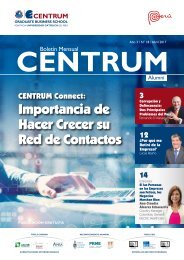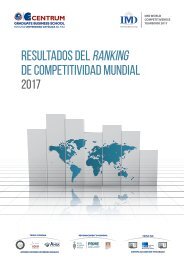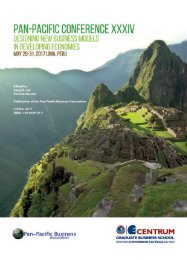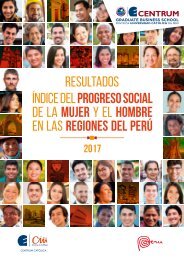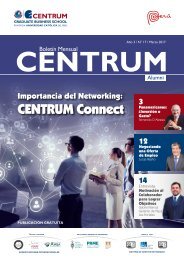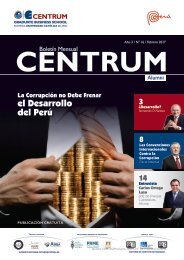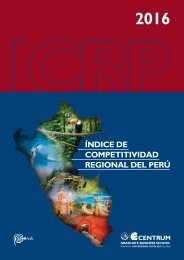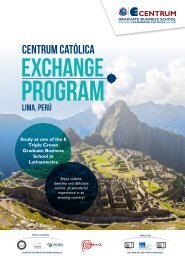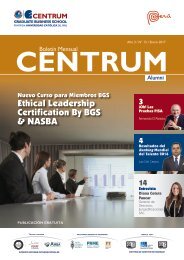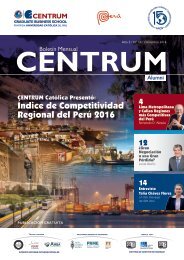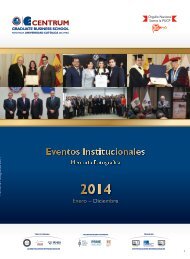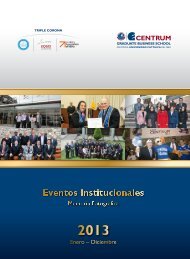Leading Change Towards a Globally Responsible Economy
Los folletos de actualidad de CENTRUM Católica presentan resúmenes de investigaciones y estudios realizados por investigadores de CENTRUM Católica y socios estratégicos, se investigan temas de diversos sectores de la producción y desarrollo económico y social del país y del mundo. Se presentan rankings de competitividad y de progreso social, así como principio de Responsabilidad Social. Estas publicaciones se realizan en formato impreso y digital y está dirigido a la opinión pública.
Los folletos de actualidad de CENTRUM Católica presentan resúmenes de investigaciones y estudios realizados por investigadores de CENTRUM Católica y socios estratégicos, se investigan temas de diversos sectores de la producción y desarrollo económico y social del país y del mundo. Se presentan rankings de competitividad y de progreso social, así como principio de Responsabilidad Social. Estas publicaciones se realizan en formato impreso y digital y está dirigido a la opinión pública.
You also want an ePaper? Increase the reach of your titles
YUMPU automatically turns print PDFs into web optimized ePapers that Google loves.
<strong>Leading</strong> <strong>Change</strong> <strong>Towards</strong> a <strong>Globally</strong><br />
<strong>Responsible</strong><br />
<strong>Economy</strong><br />
Communication on Engagement from 2013 to 2016
LEADING CHANGE TOWARDS A GLOBALLY<br />
RESPONSIBLE ECONOMY<br />
A publication of CENTRUM Católica Graduate Business<br />
School and the Pontificia Universidad Católica del Perú<br />
(PUCP).<br />
Ruben Guevara<br />
Author<br />
James Rudolph<br />
English Editing<br />
CENTRUM Publishing:<br />
Carolina Pretell<br />
Editorial Manager<br />
Aída del Rocío Vega<br />
Executive Editor and Edición<br />
<strong>Leading</strong> <strong>Change</strong> <strong>Towards</strong> a <strong>Globally</strong> <strong>Responsible</strong> <strong>Economy</strong><br />
First digital edition, October 2016<br />
© CENTRUM Católica – Business Centre of the Pontificia<br />
Universidad Católica del Perú<br />
Jr. Daniel Alomía Robles 125 - 129 Los Álamos de<br />
Monterrico, Santiago de Surco, Lima 33 - Perú<br />
Telephone: 0051-1-626-7100<br />
Email: centrumpublishing@pucp.edu.pe<br />
Web: www.centrum.pucp.edu.pe<br />
Address all communications pertaining this CoE to:<br />
Professsor Ruben Guevara at rguevara@pucp.pe or by<br />
phone +(511) 626-7100.<br />
The reproduction of this book in any media, totally or<br />
partially, without the express permission of the editors is<br />
strictly prohibited.<br />
© All rights reserved<br />
Ebook format<br />
ISBN: 978-612-4139-42-0
Pontificia Universidad Católica del Perú<br />
CENTRUM Católica Graduate Business School<br />
<strong>Leading</strong> <strong>Change</strong> <strong>Towards</strong> a <strong>Globally</strong><br />
<strong>Responsible</strong> <strong>Economy</strong><br />
Communication on Engagement in the UN Global Compact from 2013 to 2016<br />
Lima, Peru, 2016
<strong>Leading</strong> <strong>Change</strong> <strong>Towards</strong> a <strong>Globally</strong><br />
<strong>Responsible</strong> <strong>Economy</strong><br />
The Mission, Vision and Values<br />
of the Pontificia Universidad Católica<br />
del Perú<br />
The Mission, Vision and Values of<br />
CENTRUM Católica Graduate Business<br />
School<br />
Mission<br />
The Pontificia Universidad Católica del Perú:<br />
• Is a pluralistic and tolerant academic community,<br />
based on ethical, democratic and Catholic principles.<br />
• Provides excellent humanistic, scientific and<br />
comprehensive training and education.<br />
• Contributes to the expansion of knowledge<br />
internationally through research and innovations.<br />
• Promotes the creation and dissemination of culture.<br />
• Assumes its commitment to human development.<br />
• Liaises effectively and permanently with its<br />
stakeholders and the external environment.<br />
Vision<br />
By 2017 our University:<br />
• Will be a national and regional academic<br />
reference in comprehensive, multi- and interdisciplinary<br />
training and education.<br />
• Will have the necessary conditions to be<br />
known as a research university.<br />
• Will be proactively involved in the discussion<br />
and the development of solutions to national<br />
problems on education, social development<br />
and sustainability.<br />
Values<br />
The values that distinguish our university are: (a)<br />
The search for the truth, (b) Honesty, (c) Justice, (d)<br />
Leadership, (e) Pluralism, (f) Respect for the dignity of<br />
the person, (g) Social responsibility and commitment<br />
to development, (h) Solidarity, and (i) Tolerance.<br />
Our Mission<br />
To contribute to the sustainable development of<br />
organizations through the education of socially<br />
responsible leaders inspired by ethical principles,<br />
Christian values, and the creation of knowledge<br />
for the benefit of our stakeholders. To develop a<br />
strategic, global and holistic vision of business<br />
in our graduate students through an effective<br />
learning experience. This process will facilitate<br />
the acquisition of knowledge, managerial skills,<br />
an entrepreneurial spirit, and best practices<br />
in business, thus permitting our graduates<br />
to lead their organizations towards global<br />
competitiveness, making us an important agent of<br />
change in society.<br />
Our Vision<br />
To continue being recognized as the leading<br />
business school in Peru, and to be ranked among<br />
the top 50 best business schools worldwide before<br />
2024. To be a globally benchmarked organization<br />
for the high quality of the education it provides,<br />
for its excellence in research, for the values<br />
instilled in our students, and for our contribution<br />
to the development of ethical managerial practices<br />
throughout society.<br />
Our Values<br />
CENTRUM Católica Values are: (a) To search for<br />
the truth, (b) To respect the dignity of the person, (c)<br />
To respect plurality, (d) To be socially responsible<br />
and committed to sustainable development, (e) To<br />
be honest, (f) To be solidary with others, and (g)<br />
To be just.<br />
Code of Ethics<br />
Our School is guided by the following Code of Ethics:<br />
Promote and ensure respect for human rights and<br />
the dignity of the members of our community and<br />
those with whom we interact.<br />
3
<strong>Leading</strong> <strong>Change</strong> <strong>Towards</strong> a <strong>Globally</strong><br />
<strong>Responsible</strong> <strong>Economy</strong><br />
Harassment of any member of our community is<br />
considered serious misconduct and unacceptable<br />
behaviour.<br />
Foster and maintain an environment of respect<br />
and tolerance in our relationships with others,<br />
whatever their position or rank.<br />
The resources made available to our community<br />
will be used wisely and efficiently, and private<br />
property, furniture, facilities and materials of<br />
CENTRUM Católica will be safeguarded.<br />
Encourage intellectual contributions and respect<br />
the moral and legal ownership of the knowledge<br />
generated by the entire academic community.<br />
All information will be generated, registered<br />
and used exclusively for academic, research, and<br />
administrative purposes, respecting the right to<br />
personal privacy. We will provide real and timely<br />
information to those requiring it.<br />
Decision-making will be entirely objective, honest,<br />
and fair.<br />
Encourage the objective and impartial development<br />
of our functions and the fulfilment of our duties.<br />
We will not accept or solicit gifts and donations for<br />
personal gain from any individual or corporation,<br />
whatever the value of the gift or donation.<br />
Sustainability is paramount to our academic,<br />
research, outreach, advocacy, and administrative<br />
activities. We will ensure the care and conservation<br />
of the environment through our daily activities<br />
and programmes in an effort to reduce their<br />
negative impact.<br />
The relationship with our suppliers should always<br />
be beneficial to both parties.<br />
Every member of our community that relates to<br />
our suppliers shall be fair, honest and responsible,<br />
and ensure protection of the interests of the<br />
institution.<br />
Students, professors and workers will reflect<br />
a positive, fair, and just institutional image to<br />
our stakeholders. Therefore, all members of the<br />
institution will act with prudence, consideration<br />
and care with our stakeholders.<br />
We are also committed to communicate about any<br />
act that disparages the image and prestige of the<br />
institution.<br />
As part of its mission, CENTRUM Católica<br />
Graduate Business School offers employees<br />
the opportunity to develop professionally and<br />
provides equal opportunities for all, according<br />
to their abilities following the internal rules of<br />
evaluation and promotion.<br />
4
<strong>Leading</strong> <strong>Change</strong> <strong>Towards</strong> a <strong>Globally</strong><br />
<strong>Responsible</strong> <strong>Economy</strong><br />
Part I<br />
Statement of Continued Support, by Professor Marcial Rubio, the Rector of the<br />
Pontificia Universidad Católica del Perú<br />
Lima, October 24, 2016<br />
Ms. Lise Kingo<br />
Executive Director of the UN Global Compact<br />
Headquarters of the United Nations,<br />
405 East 42nd Street,<br />
New York, NY 10017<br />
Dear Ms. Kingo:<br />
I am pleased to reaffirm our University´s commitment and support to the UN Global Compact and to its ten<br />
Principles dealing with Human Rights, Labour, the Environment, and Anti-Corruption.<br />
The Pontificia Universidad Católica del Perú (PUCP) is the most prestigious higher education institution in<br />
Peru, and one of the top universities in Latin America and the Caribbean. Next year it is going to celebrate its<br />
100 th Anniversary. It is based in Lima, has approximately 25,000 students, and houses eleven Colleges, four<br />
Schools, twenty one Research and Cultural Centres, and is actively involved in national and international<br />
affairs.<br />
The PUCP is a global referent in human rights. It has played a pivotal role in advancing the discussion of<br />
this topic. A former rector, Dr. Salomón Lerner, led the National Commission on Truth and Reconciliation,<br />
which was launched by Peru’s president Valentín Paniagua in 2001 to complete a report and to formulate<br />
recommendations dealing with the internal armed conflict that afflicted Peru from 1980 until 2000. In<br />
2004, the PUCP created the Institute for Democracy and Human Rights with the purpose of strengthening<br />
democracy and the observance of human rights in Peru through formal education and vocational training,<br />
applied research, the creation of spaces for dialogue and debate, and public policy advocacy in civil society<br />
and the government.<br />
This CoE is focused in the work of our Graduate Business School, CENTRUM Católica, and the activities<br />
carried out as well as the outcomes of this unit in advancing the ten Principles of the UN Global Compact.<br />
Needless to say, PUCP is also heavily and actively involved in numerous activities that are aligned with the<br />
Principles. Our commitment to graduating responsible business leaders, carrying out leading research dealing<br />
with these issues, and in advancing and advocating for positions and change that will impact positively in<br />
the future of humanity and our planet earth are our top priority.<br />
Kind regards,<br />
Dr. Marcial Rubio<br />
Rector<br />
Pontificia Universidad Católica del Perú<br />
5
<strong>Leading</strong> <strong>Change</strong> <strong>Towards</strong> a <strong>Globally</strong><br />
<strong>Responsible</strong> <strong>Economy</strong><br />
Statement of Continued Support by Professor Fernando D’Alessio, Director-General,<br />
CENTRUM Católica Graduate Business School<br />
Lima, October 24, 2016<br />
Ms. Lise Kingo<br />
Executive Director of the UN Global Compact<br />
Headquarters of the United Nations,<br />
405 East 42nd Street,<br />
New York, NY 10017<br />
Dear Ms. Kingo:<br />
I am also pleased to reaffirm our commitment and support to the advancement of the ten UN Global<br />
Compact Principles, and to the UN Global Compact Secretariat. It was our school that asked the rector of our<br />
university to become a signatory of this organization. Since our inception sixteen years ago, we have been a<br />
leader in ethics and business, business and society, responsible leadership, corporate social responsibility,<br />
and in business and sustainable development. This decision is our driver in seeking avenues and solutions<br />
for business to become a force for good, and for contributing to the creation of a better world for all.<br />
Our MBA and DBA Programmes reflect this determination. All of our students develop competences and<br />
attitudes to be change agents. Our graduates are leading personalities in the private sector, government,<br />
academia and in civil society organizations in Peru, Latin America, and abroad.<br />
Since 2008, our school has been a UN PRME signatory and since 2013, we have been a UN PRME Champion.<br />
In 2013, the Latin American Chapter of the UN PRME was founded on our campus. Our school was the first<br />
to Chair this Chapter. Furthermore, CENTRUM Católica is one of 57 business schools worldwide that have<br />
earned the Triple Crown, the most coveted international accreditations in the world: AACSB International,<br />
EQUIS and AMBA. We also continue to advance in the world rankings among the business schools. The<br />
Financial Times in 2015 ranked CENTRUM Católica´s Executive MBA as the 52nd best worldwide. That same<br />
year this newspaper also placed the school´s Online MBA in 13th place in the world, and in the first place in<br />
Latin America; Executive Education was placed as the 65th best in the world. Likewise, the 2015 Eduniversal<br />
Best Masters Ranking placed the Full-Time MBA, Managerial MBA, and Global MBA Programmes in the first<br />
place in Latin America. It placed the specialised MBA in Supply Chain Management as one of the six best in<br />
the world.<br />
These achievements recognise that the school offers programmes of academic excellence that meet the<br />
highest international quality standards. Our renewed commitment to the UN Global Compact is a critical<br />
part of that ongoing effort.<br />
Very truly yours,<br />
Dr. Fernando D’Alessio<br />
Director General<br />
CENTRUM Católica Graduate Business School<br />
6
<strong>Leading</strong> <strong>Change</strong> <strong>Towards</strong> a <strong>Globally</strong><br />
<strong>Responsible</strong> <strong>Economy</strong><br />
Part II<br />
Description of Actions and Outcomes<br />
Summary<br />
The Pontificia Universidad Católica del Perú and<br />
CENTRUM Católica Graduate Business School are<br />
fully committed to implementing and promoting the<br />
ten Principles of the UN Global Compact. During the<br />
last three years we have advanced these Principles<br />
inside and outside the institution. Emphasis was<br />
given to graduating globally responsible business<br />
leaders, carrying out applied research aimed at<br />
contributing to sustainable solutions in business<br />
and government, and working within the UN<br />
PRME network of business schools to advance<br />
responsible leadership, ethical business, corporate<br />
social responsibility, and sustainable development.<br />
Results so far have been outstanding.<br />
Among the achievements of this period at<br />
CENTRUM Católica, the most important are: (a)<br />
incorporating the UN PRME into the curriculum<br />
of the MBA, DBA and executive educations<br />
Programmes; (b) carrying out research and<br />
outreach to support public policies and decisionmaking<br />
in business, government, and civil society<br />
organizations in association with the Principles<br />
of the UN Global Compact, and the UN PRME;<br />
(c) liaising with business, government, and other<br />
business schools to advance the above-mentioned<br />
principles; (d) graduating globally responsible<br />
business leaders with a change agent mentality and<br />
equipped with the knowledge and tools to change<br />
the business world, and (e) carrying out proactive<br />
and effective advocacy to accelerate change that<br />
seeks to build a better world for everyone.<br />
HUMAN RIGHTS<br />
Global Compact Principle 1: Businesses should<br />
support and respect the protection of internationally<br />
proclaimed human rights<br />
Global Compact Principle 2: Make sure that they<br />
are not complicit in human rights abuses<br />
Our university has always been a stalwart of<br />
human rights in Peru. Some of our Professors and<br />
a former rector are well-known global authorities<br />
in this field. One of our Professors was Chairman<br />
of the Inter-American Court of Human Rights,<br />
the highest Court of Justice in the American<br />
continent in this field. CENTRUM Católica is<br />
an integral part of the university and therefore<br />
is also committed to respect and promote<br />
internationally proclaimed human rights. We<br />
are a leading business school in teaching about<br />
third generation human rights: intergenerational<br />
rights associated with sustainable development<br />
and solidarity rights dealing with human<br />
well-beings. We are proactive leaders in seeking<br />
ways for the production of Common Goods, and<br />
the conservation of eco-systematic functions and<br />
environmental protection in business.<br />
CENTRUM Católica is a member of the United<br />
Nations Principles for <strong>Responsible</strong> Management<br />
Education (UN PRME), launched by the UN<br />
Global Compact in 2008. Our school has always<br />
been committed to engaging in a continuous<br />
process of improvement while applying the UN<br />
PRME Principles, reporting on progress to all our<br />
stakeholders and exchanging effective practices<br />
with other academic institutions. Starting in 2012,<br />
CENTRUM Católica included themes dealing<br />
with sustainability, ethics, and corporate social<br />
responsibility in the syllabi of most courses in the<br />
MBA Programmes, in the Doctoral Programme,<br />
and in Executive Education Programmes.<br />
These include: (a) Ethical analysis of business,<br />
(b) Corporate governance, (c) Development of<br />
organisational culture guided by social values, and<br />
(d) Design and implementation of strategic plans<br />
that ensure competitiveness and sustainability of<br />
business and the development of business models<br />
aimed at the base of the pyramid.<br />
Case studies and readings covering topics of<br />
ethics, social responsibility and environmental<br />
stewardship are used throughout our academic<br />
programmes. Students are encouraged to use<br />
topics of social impact in their thesis work and<br />
proposed cases. A significant number of final<br />
MBA theses have consisted of field research on<br />
7
<strong>Leading</strong> <strong>Change</strong> <strong>Towards</strong> a <strong>Globally</strong><br />
<strong>Responsible</strong> <strong>Economy</strong><br />
the application of business social responsibility<br />
theory to particular Peruvian companies.<br />
Our MBA core curriculum contains a full-term<br />
required course called “Ethics and Social<br />
Responsibility.” The main objective of this course<br />
is to provide participants with knowledge of<br />
the principles and strategic management tools<br />
of business social responsibility for responsible<br />
and effective decision-making that places people<br />
and the planet at the centre of socioeconomic and<br />
environmental development. It also seeks to reflect<br />
on business decisions from the perspective of ethics<br />
and social responsibility. The core curriculum also<br />
contains a course called “Strategic Management,”<br />
in which topics of ethics are analysed as a key<br />
component of the strategic planning process and<br />
in strategizing. The MBA Programme curricula<br />
also include entrepreneurship courses in which<br />
emphasis is given to businesses that use a<br />
sustainability approach and create shared value.<br />
Our MBA Programmes were recognised by the<br />
Aspen Institute in its 2011-2012 Beyond Grey<br />
Pinstripes ranking as the best in Latin America<br />
and number 77th in the world for its content on<br />
social and environmental stewardship, and the<br />
exposure its students have to these topics.<br />
We also offer a 12-course, 240-hour Specialised<br />
Master’s non-degree programme in Corporate Social<br />
Responsibility with the stated objective “to develop<br />
students’ business management skills within a new<br />
approach and methodology of corporate social<br />
responsibility and sustainability.” Furthermore,<br />
CENTRUM Católica carries out the International<br />
Week each year in the month of September, with the<br />
participation of around 500 alumni and students,<br />
covering themes aligned with the UN PRME.<br />
Our ultimate goal is to have a range of graduate<br />
educational and research programmes that<br />
create synergies that contribute decisively to the<br />
creation of a new corporate culture that, handin-hand<br />
with business social responsibility and<br />
environmental protection, contribute to taking<br />
concrete actions toward the achievement of<br />
sustainable development.<br />
LABOUR<br />
Global Compact Principle 3: Businesses should<br />
uphold the freedom of association and the effective<br />
recognition of the right to collective bargaining<br />
Global Compact Principle 4: The elimination of<br />
all forms of forced and compulsory labour<br />
Global Compact Principle 5: The effective abolition<br />
of child labour<br />
Global Compact Principle 6: The elimination<br />
of discrimination in respect of employment and<br />
occupation<br />
The Human Factor is the most important asset in<br />
an organization. Employees at CENTRUM Católica<br />
are given full opportunity to develop professionally.<br />
To this end, we grant scholarships to study at our<br />
MBA Programme or to complete training courses at<br />
other institutions. We conduct periodic on-campus<br />
health campaigns, where the school invites health<br />
and wellness specialists to advise our employees.<br />
Furthermore, we conduct periodic on-campus<br />
fitness campaigns including after-office fitness<br />
training sessions and sports tournaments.<br />
All of our employees exercise their labour rights.<br />
The university has a Union. All of our employees are<br />
given the opportunity to grow and advance within<br />
the organization. We have health campaigns, and a<br />
health check-up once a year. Our employees have<br />
a lengthy vacation time twice a year. They have job<br />
stability. We do not discriminate on the basis of<br />
gender, colour, race, national origin or age.<br />
8
<strong>Leading</strong> <strong>Change</strong> <strong>Towards</strong> a <strong>Globally</strong><br />
<strong>Responsible</strong> <strong>Economy</strong><br />
Our Centre for Women’s Studies is aimed at<br />
the promotion, development and publication of<br />
research that will help understand the role of<br />
women in Peru’s economy, seeking to contribute to<br />
gender equality and gender justice in the country<br />
and in Latin America. The centre is engaged in<br />
research on issues related to the integration of<br />
women in the economic activities of Peru, and is<br />
dedicated to generating tools that strengthen and<br />
develop the managerial capabilities of women.<br />
Between 2013 and 2016 the Centre for Women’s<br />
Studies published several works and advised<br />
several MBA theses related to these topics.<br />
ENVIRONMENT<br />
Global Compact Principle 7: Businesses should<br />
support a precautionary approach to environmental<br />
challenges<br />
Global Compact Principle 8: Undertake initiatives<br />
to promote greater environmental responsibility<br />
Global Compact Principle 9: Encourage the<br />
development and diffusion of environmentally<br />
friendly technologies<br />
CENTRUM Católica was one of the first 100<br />
organizations to sign on to the United Nations<br />
Global Compact’s PRME. We are certified by<br />
Lloyd´s Quality Register of London as a n ISO<br />
9001-2015, ISO 14001-2015 certified organization,<br />
and as an ISO 26000 pre-certified organization.<br />
This achievement is unique among business<br />
schools worldwide.<br />
CENTRUM Católica continued to work toward<br />
the incorporation of the UN PRME in all of its<br />
Programmes. It also continued to implement<br />
UN PRME-related strategic activities within<br />
the organization, and with numerous strategic<br />
partners. Research conducted during this period<br />
included, just to mention a few, themes on the<br />
social license to operate in the extractive industries,<br />
willingness to pay for products and services that<br />
have social responsibility attributes, eco-efficiency<br />
in industrial sectors in Peru and Colombia, status<br />
of the shared value creation in nine economic<br />
sectors in Peru, gender balance in business in<br />
Brazil, Colombia, and Peru. This research sought<br />
to contribute to making corporations better global<br />
corporate citizens. As stated above, most courses<br />
in the MBA curricula have social responsibility<br />
as a key component. For example, all finance<br />
courses include responsible finance content;<br />
most operations courses include efficiency,<br />
some being eco-efficiency; marketing courses<br />
include responsible marketing and responsible<br />
consumption content. All MBA students make<br />
international trips to the USA or Europe, including<br />
visits to corporations that are members of the UN<br />
Global Compact, where they learn how they are<br />
applying those principles.<br />
We are an eco-efficient organization. Since<br />
2009, we have carried out a plan to reduce the<br />
consumption of electricity, water, paper, printed<br />
materials, and other inputs by adopting better<br />
technology and by implementing much more<br />
efficient processes. We also recycle paper and<br />
paper products and plastic bottles.<br />
In terms of contributing to the sustainable<br />
development of organizations through the<br />
formation of socially responsible leaders inspired<br />
by ethical principles, our Centre for Social<br />
Responsibility, Entrepreneurship and Sustainability<br />
Studies (CERES), created in 2013, leads innovative<br />
research and collaborative activities for assisting<br />
companies and other institutions to address the<br />
challenges they face in adapting to and becoming<br />
leaders in sustainable development. We carried our<br />
research dealing with the social license to operate<br />
in the extractive industries, eco-efficiency in nine<br />
9
<strong>Leading</strong> <strong>Change</strong> <strong>Towards</strong> a <strong>Globally</strong><br />
<strong>Responsible</strong> <strong>Economy</strong><br />
responsible companies and to grant them the CSR<br />
Prize. Since 2009, CENTRUM Católica’s professors<br />
have been judges of the National CSR Prize and<br />
the National CSR Distinction, given by Peru 2021<br />
to corporations with the best record of social and<br />
environmental behaviour.<br />
Our school is a leading member of the <strong>Globally</strong><br />
<strong>Responsible</strong> Leadership Initiative’s 50+20 Agenda,<br />
which seeks to develop a vision for the transformation<br />
of management education. The common tenet of<br />
being the best in the world is revised in favour of<br />
creating businesses that are designed and led to be<br />
the best for the world.<br />
business sectors, consumers’ willingness to pay for<br />
social responsibility attributes in products in all<br />
productive sectors in Peru.<br />
CERES has developed a methodology to<br />
measure social responsibility levels in Peruvian<br />
companies – the Corporate Reputation Index<br />
(IRCA). This Index measures social responsibility<br />
levels among Peruvian companies, and evaluates<br />
the impact of social responsibility on corporate<br />
reputation. CENTRUM Católica also carries<br />
out the yearly Regional Competitiveness Index<br />
of Peru and the Regional Social Progress Index<br />
of Peru. These indices have environmental<br />
components in their structure. These results<br />
help government and business to improve their<br />
performance, including taking steps to contribute<br />
to sustainable development.<br />
Furthermore, topics of ethics, social responsibility<br />
and sustainability have been woven into the<br />
individual courses in each MBA course curriculum,<br />
helping students develop an understanding of<br />
responsible risk management and sustainable value<br />
creation on the basis of the environmental, social<br />
and governance impacts of business. Furthermore,<br />
a specific Corporate Social Responsibility and<br />
Ethics course is part of all MBA programs.<br />
Each year, CENTRUM Católica and our university<br />
help Peru 2021, the national association of socially<br />
responsible corporations, to select the most socially<br />
One of the key activities implemented within the<br />
organisation is the “Clima de Cambios (Climate of<br />
<strong>Change</strong>)” campaign, a university-wide commitment<br />
to be eco-efficiency: reducing, reusing or rethinking<br />
inputs; improving processes, and recycling and<br />
repowering outputs and the way we operate to<br />
minimize the negative impact in the environment.<br />
A successful recycling programme has evolved into<br />
a current effort to be paperless to the extent possible,<br />
where student source materials are increasingly<br />
online, limiting the use of physical materials<br />
and textbooks. All CC employees go through an<br />
induction process in which they are familiarised<br />
with CC’s environmental policies.<br />
Our Approach to corporate social responsibility,<br />
published in the principles that guide the school’s<br />
operations, include the following: (a) Focus on<br />
ethics and corporate social responsibility, (b)<br />
Promote humanistic thinking as a basic principle<br />
and value, (c) Generate knowledge for the benefit<br />
of humanity<br />
ANTI-CORRUPTION<br />
Global Compact Principle 10: Businesses should<br />
work against corruption in all its forms, including<br />
extortion and bribery<br />
According to Professor Fernando D’Alessio,<br />
CENTRUM Católica’s founder, the values of<br />
an organization should be considered as the<br />
most important policy guidelines. He added<br />
that they are also the framework for establishing<br />
performance standards for executives, and a guide<br />
in the decision-making process in organizations.<br />
CENTRUM Católica’s Values are: (a) To search for<br />
10
<strong>Leading</strong> <strong>Change</strong> <strong>Towards</strong> a <strong>Globally</strong><br />
<strong>Responsible</strong> <strong>Economy</strong><br />
the truth, (b) To respect the dignity of the person, (c)<br />
To respect plurality, (d) To be socially responsible<br />
and committed to sustainable development, (e) To<br />
be honest, (f) To express solidarity with others, and<br />
(g) To be fair.<br />
We teach about corruption in several MBA and DBA<br />
courses: Ethics and CSR, Strategic Management,<br />
Leadership and Management, Sustainable<br />
Entrepreneurship, Finance, Macro and Micro<br />
Economics, to mention a few. Our commitment<br />
to ethics, responsibility and sustainability has<br />
always been present in our Mission, Vision, Longterm<br />
Objectives, institutional strategies and in all<br />
of our activities.<br />
Our published Values and Principles Guide<br />
encourage staff involvement in service and<br />
community activities. The values specifically<br />
state that the foundation and the uniqueness of<br />
the school lies in the search for truth; respect for<br />
personal dignity; emphasis on pluralism and social<br />
responsibility; and commitment to development,<br />
honesty, solidarity and justice. CENTRUM Católica<br />
has an Ethics Committee that monitors, evaluates,<br />
and issues recommendations on the behaviour of<br />
any member of our community who may represent<br />
a violation of the commitments and obligations<br />
established in the Code of Ethics.<br />
CENTRUM Católica implements a range of<br />
graduate educational and research programmes<br />
that create synergies and contribute decisively to the<br />
education of a new corporate cadre of professionals<br />
who are contributing concrete actions toward<br />
the achievement of sustainable development.<br />
Our priority for the coming years is to continue<br />
strengthening our MBA and DBA Programmes,<br />
our research, our outreach and advocacy activities,<br />
and our leadership worldwide to contribute much<br />
more effectively to accelerated change at the school,<br />
corporations, government, and society in general,<br />
seeking to achieve a critical mass of responsible<br />
business leaders, to lead responsible corporations<br />
within the framework of a responsible global<br />
economy and sustainable development. We also<br />
have numerous public events every year, with the<br />
participation of more than 10,000 persons, and do<br />
advocacy and think-tank-like work using the media<br />
to advance ideas, initiatives, and change in Peru<br />
and abroad.<br />
Conclusions<br />
The Pontificia Universidad Católica del Perú and<br />
CENTRUM Católica Graduate Business School<br />
are fully committed to implement and promote<br />
the ten Principles of the UN Global Compact. The<br />
University and the Graduate Business School are<br />
working to advance continuous improvements in<br />
all of their programmes and activities in association<br />
with those Principles.<br />
CENTRUM Católica is a leading business school<br />
committed to ethics in business and academia,<br />
responsible leadership, corporate social<br />
responsibility and sustainable development,<br />
which are fully aligned with the ten UN Global<br />
Compact Principles. The school is also fully<br />
committed with the six UN PRME Principles, and<br />
in finding better ways for business to contribute to<br />
the creation of Common Goods, a better world for<br />
everyone, and the conservation and protection of<br />
the environment.<br />
Among the achievements of this period at<br />
CENTRUM Católica, the most important are: (a) the<br />
incorporation of the UN PRME in the coursework<br />
of the MBA, DBA and executive educations<br />
Programmes; (b) carrying out research and outreach<br />
to support public policies and decision-making<br />
in business, government, and civil society<br />
organizations in association with the Principles<br />
of the UN Global Compact and the UN PRME;<br />
(c) liaising with business, government, and other<br />
business schools to advance the above-mentioned<br />
Principles; (d) graduating globally responsible<br />
business leaders with a change agent mentality<br />
and equipped with the knowledge and tools<br />
to change the business world, and (e) carry out<br />
proactive effective advocacy to accelerate change,<br />
while seeking to build a better world for everyone.<br />
References<br />
This CoE took information from official documents<br />
of the Pontificia Universidad Católica del Perú, and<br />
CENTRUM Católica Graduate Business School. It<br />
also took information from reports prepared for<br />
the EFMD Quality Improvement System (EQUIS)<br />
and for the UN PRME, and in particular the Sharing<br />
Information on Progress Report 2014-2015.<br />
11


